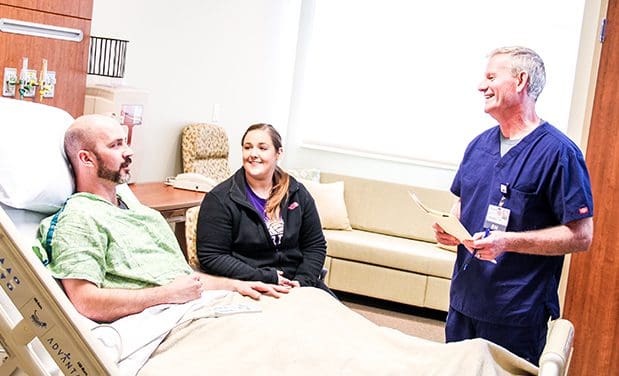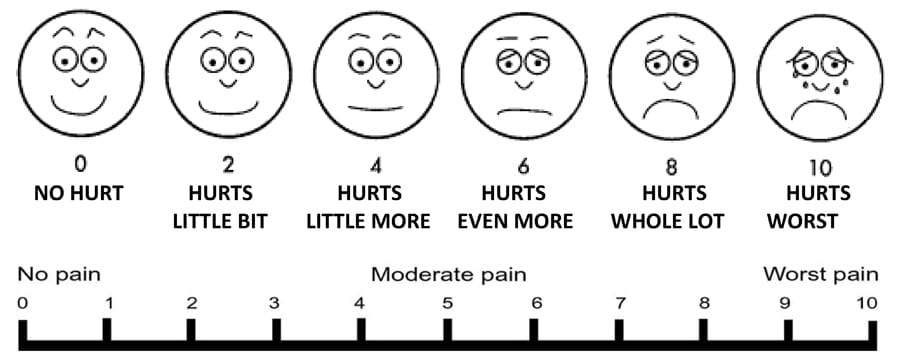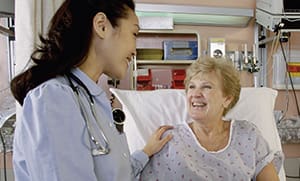Care After Surgery

Right after your surgery, you might go to the recovery room (Post-Anesthesia Care Unit or PACU). You will be there for one or two hours.
After recovery at Memorial Hospital Belleville, you will go to a room in the Outpatient Surgery Center or a hospital room if you need to stay longer. At Memorial Hospital Shiloh, if you do not go to the PACU, you will go to your post-operation room until you can go home.
Pain Relief
You should:
- Get answers to your questions about pain.
- Feel your doctor or nurse believe you when you are hurting.
- Feel the staff cares about treating your pain.
- Get a quick answer when you tell your doctor or nurse about pain.
- Have the best treatments for pain.
Ways you can help:
- Ask your doctor or nurse what kind of pain you might have.
- Talk about pain relief choices with your doctor or nurse.
- Talk to your doctor or nurse about a pain relief plan.
- Ask for pain relief as soon as the pain starts.
- Help doctors and nurses measure your pain.
- Tell your doctor or nurse about any pain that will not go away.
Talking About Pain Relief
- Tell your doctor or nurse that you are in pain.
- Keep a diary with notes about when and where you have pain.
Here are some questions that you might try to answer when you talk to your doctor or nurse about pain:
- Where is the pain? Chest, shoulder, neck, back, arm, leg, foot, hand, head, or other.
- How would you describe the pain? Sharp, dull, aching, throbbing, pins and needles, or other.
- Does the pain come and go, or is it there all the time?
- What makes the pain better? Is it better when I lay down, stand up, walk, sit in a chair, sleep, eat, read, move in a certain way?
- What makes the pain worse? Is it worse when I lay down, stand up, walk, sit in a chair, read, sleep, eat, get dressed, move in a certain way?
- Does the pain stop you when you lie down, stand up, walk, sit in a chair, read, sleep, eat, bathe, get dressed, move in a certain way?
How to measure pain
One way to measure pain is with a “pain scale.” One type of pain scale asks you to pick a number from 0 to 10 to measure the pain. Another scale uses happy and sad faces to match how the pain feels. Nurses and doctors might also ask you to describe your pain. No matter which scale you use, give the best answer, so the treatment can help.

How to Relieve Pain
- Medicine
- Change your position
- Balms
- Massages, back rubs
- Heat or cold packs
- A soothing bath
- Music to help you relax
- Meditation
- Something to take attention away from pain, such as a game, puzzles, TV, a book
Talk with your nurse or doctor about other ways to help with pain.
Recovery
The instructions your surgeon and care team give you will help you recover. You can help in your recovery by doing breathing and moving exercises in the recovery room.
You will be asked to breathe deeply and cough to help clear your lungs, help with circulation, and help prevent pneumonia.
It is important that your circulation and body functions go back to normal after your surgery. You can help get these back to normal by moving around, sitting up in a chair, and even walking.
Incision and Dressing Care
Your incision area (where the surgeon cut to perform the surgery) will be cleaned and dressed after surgery. Before you leave the hospital, a healthcare team member will show you how to care for the area. Be sure you understand the instruction sheet your care team gives you.
Sources for Pain Section
The patients’ bill of rights for pain management, 2000. Purdue Pharma L P, Norwalk, CT 06850-3590. Portions reproduced by permission.
Peak Development for Nursing Assistants© — Acute and Chronic Pain. Peak Development Resource, LLC. Sept. 2003; 3: No. 9.
McCaffery M, Pasero C: Pain: Clinical manual, p. 67, 1999, Mosby, Inc. Duplicated by permission.
Wong-Baker FACES Pain Rating Scale from Wong D L, Hockenberr-Eaton M, Wilson D, Winkelstein M L, Schwartz P: Wong’s Essentials of Pediatric Nursing, ed. 6, St. Louis, 2001, p. 1301. Copyrighted by Mosby, Inc. Reprinted by permission.


